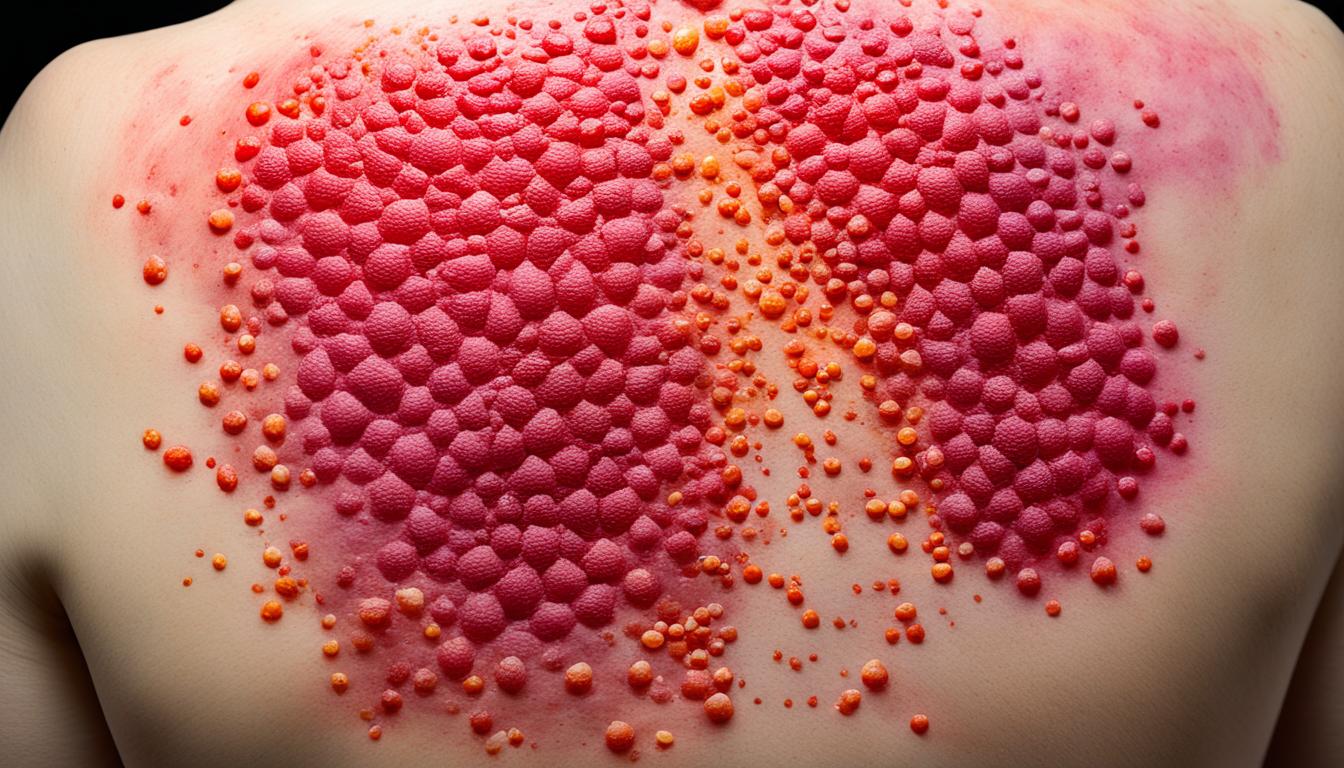Herpes zoster, or shingles, comes from the varicella-zoster virus. When this virus reactivates, it causes shingles. You might notice a painful rash showing up as a line of blisters on one body side. This happens even years after having chickenpox.
Shingles brings several signs like pain, burning, and a rash that feels sensitive or tingly. The rash has blisters filled with fluid. If not treated, shingles can cause further problems. One of these is postherpetic neuralgia, where someone feels pain even after their rash is gone.
Doctors often use antiviral medications to help with shingles. They aim to lessen how bad it gets and how long it lasts. Helping patients manage pain is a big part of treatment too. Stem cell therapy is a new method showing promise in helping shingles heal faster.
The shingles vaccine is another useful way to avoid getting shingles and its complications. It’s important for high-risk groups, like the elderly or those with weak immune systems, to get this vaccine. Regular vaccines help keep everyone safe.
Key Takeaways:
- Herpes zoster, also known as shingles, is caused by the reactivation of the varicella-zoster virus.
- Shingles is characterized by a painful rash with fluid-filled blisters.
- Common symptoms of shingles include pain, burning, tingling, and sensitivity to touch.
- Treatment options for shingles include antiviral medications, pain management strategies, and stem cell therapy.
- Vaccines, such as the shingles vaccine, are available to prevent shingles and reduce the risk of complications.
Causes and Risk Factors of Herpes Zoster
Herpes zoster, or shingles, comes from the same virus as chickenpox. After you have chickenpox, the virus stays in your body. Later, it can become shingles. This usually happens when your immune system is weaker or as you get older.
The chances of getting shingles go up with a few factors. For instance:
- Getting older means you have a higher shingle risk, especially if you’re over 50.
- Having had chickenpox before can make you more prone to shingles.
- Illnesses like cancer, HIV/AIDS, or certain drugs that lower your immunity can increase shingles risk.
- Cancer treatments such as radiation or chemotherapy might lead to shingles.
- Using steroids for a long time can also make you more likely to get shingles.
- Health issues including diabetes can weaken your immune system, upping your shingles risk.
If you’re at risk, knowing about shingles and how to prevent it is crucial. By learning about the causes and risks, you can protect your health better. This includes knowing when to see a doctor.
Example Table: Risk Factors for Herpes Zoster
| Risk Factors | Description |
|---|---|
| Advancing age | The risk of shingles increases with age, especially in individuals over 50. |
| History of chickenpox | Having previously had chickenpox increases the likelihood of developing shingles. |
| Weakened immune system | Conditions like cancer, HIV/AIDS, and certain medications weaken the immune system and raise the risk of shingles. |
| Radiation or chemotherapy | Treatment for cancer, such as radiation therapy or chemotherapy, can increase the likelihood of shingles reactivation. |
| Long-term use of steroids | Prolonged use of corticosteroids can suppress the immune system, making an individual more susceptible to shingles. |
| Medical conditions | Certain medical conditions, like diabetes, can compromise the immune system, increasing the risk of shingles. |
Diagnosis, Treatment, and Prevention of Herpes Zoster
Herpes zoster, or shingles, is diagnosed by how it looks and the symptoms felt. A doctor can often tell by the rash, pain, and tingling. Sometimes, they might do tests like a Tzanck smear or viral culture to be sure.
Treating it involves antiviral medicines. Drugs such as acyclovir, valacyclovir, or famciclovir lessen the sickness’s impact. Pain can be managed with over-the-counter or prescription drugs. Extra care is needed if complications like postherpetic neuralgia or skin infections happen.
It’s best to avoid shingles if possible. People 50 and up should get the Shingrix vaccine. It helps prevent shingles and makes any case less severe. Talking to a doctor about vaccination is key to staying healthy.

